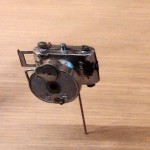The Houston Police Department says police officers will soon be testing small cameras attached to their shirts or even their glasses. This, they say, is an attempt to bring down officer complaints and to provide clear evidence for use in criminal cases. But if other cities are any indication, the cameras may bring out the best behavior in everyone.
 “This is something that can make a difference when officers are complained on. You don’t have to spend resources to investigate frivolous complaints,” said Houston Police Chief Charles McClelland. “Sometimes when people make complaints and they see themselves on video, they drop the complaints.”
“This is something that can make a difference when officers are complained on. You don’t have to spend resources to investigate frivolous complaints,” said Houston Police Chief Charles McClelland. “Sometimes when people make complaints and they see themselves on video, they drop the complaints.”
McClelland has a point. Perception and reality can be different, and when confronted with a video of a particularly emotionally charged situation, many people would likely be surprised at how the reality of what happened may have differed slightly from their perception at that time. However, these little cameras can’t catch everything; they certainly aren’t error proof; and the forthcoming drop in complaints could be due to something else altogether.
Houston isn’t the first city to get these lapel cams and they certainly won’t be the last. Larger departments across the country are in various stages of implementing them. And in some cities, officials have realized that everyone acts a little better when they are being recorded.
When you are on video, whether you are an officer or a citizen, and you know you are being recorded, your actions may be a little different. If you know the footage can be used against you, no matter who you are, you may be more likely to avoid confrontation and to follow protocol, in the case of officers.
The city plans on outfitting 100 officers from various districts with the cameras beginning next summer and then tracking them to see how they may affect officer complaints. While officials seem the believe complaints will drop because citizens will rethink allegations of misconduct when they see themselves on video or know they are being recorded, no one seems to address the fact that misconduct allegations might drop because cops will be on their best behavior.
It isn’t clear yet what policy will be for these cameras. For instance, will the officer have the ability to shut it off when he sees fit and how long will footage be kept? Details like these, crucial in the administration of justice, will likely be ironed out in coming months.
If you are accused of committing a crime in Texas, whether it’s a drug offense or assault on an officer, you need an advocate in the system. Contact our offices today to discuss the details of your case and how we might be able to help.







